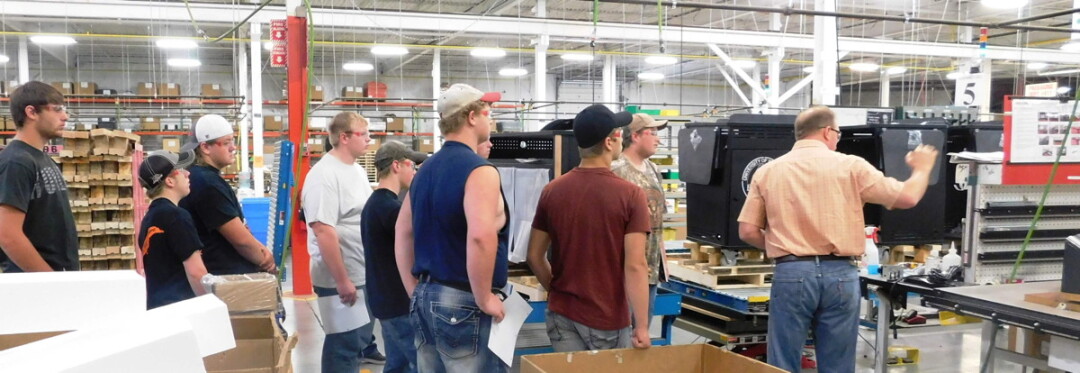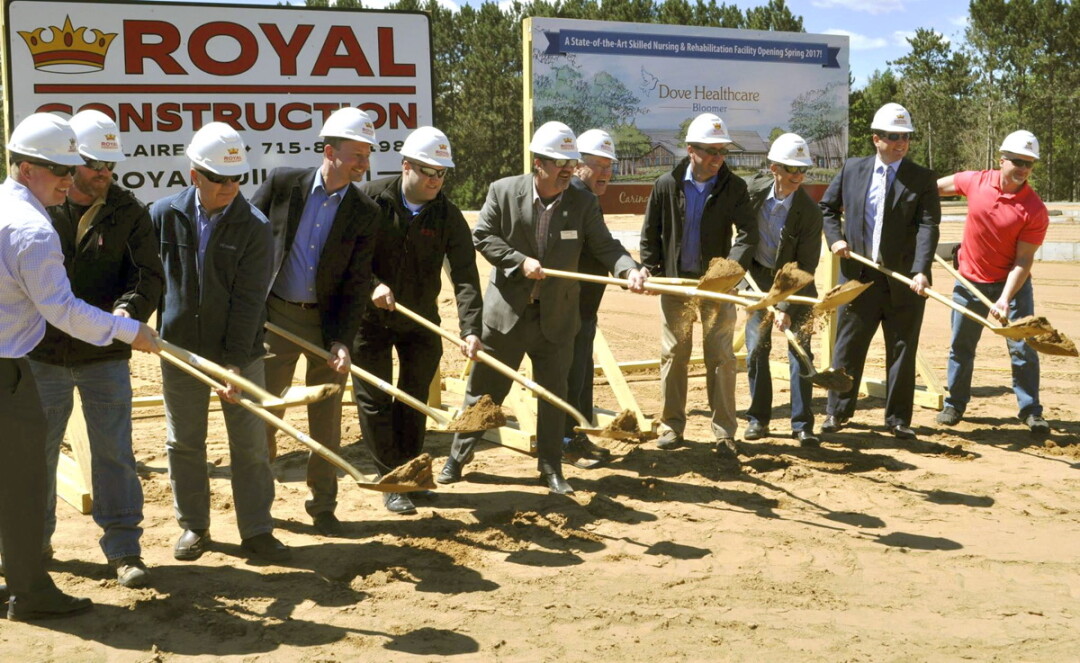
The story of Chippewa County has always been one of entrepreneurs and innovators, from people with household names like Jacob Leinenkugel and Seymour Cray to scores of unsung business owners whose hard work generated the economic growth that has helped the community thrive. And while business is often seen as the solitary realm of self-made men and women, a healthy economic requires teamwork among businesses, governments, and community leaders.
"It takes a lot of cooperation, a lot of different players, a lot of different puzzle pieces." – Charlie Walker, Chippewa County EDC
In Chippewa County, the Chippewa County Economic Development Corporation serves as the hub of a wheel of beneficial relationships that drives businesses forward. A nonprofit public-private partnership headquartered in Chippewa Falls’ Riverside Industrial Park, the Chippewa County EDC exists to attract new businesses to the county, boost existing industries, and advocate for the overall economic health of the county.
“It is a team activity,” explains Charlie Walker, who has served as the agency’s executive director for 11 years. “It takes a lot of cooperation, a lot of different players, a lot of different puzzle pieces. It’s very dynamic and unique in how different projects come to realization.”
Consider, for example, two of the EDC’s recent successes: attracting Star Blends and Mills Fleet Farm to build facilities in the fast-filling Lake Wissota Business Park. Together the projects, both of which are now under construction, will bring an estimated 355 new jobs to the county. Each followed its own path to success, and along the way the Chippewa County EDC and its partners were there to foster the process.
Star Blends, a Sparta-based blender of cattle feed, was seeking to build a location in western Wisconsin that would allow it to move into new markets. Mills Fleet Farm was conducting a multi-state search to find the site for a Midwest distribution facility to fuel its stores’ growth. Fleet Farm’s consultant contacted the Chippewa County EDC, the Wisconsin Economic Development Corp., and Momentum West, an economic development group that serves 10 counties in the region. In such situations, the EDC receives a request for proposal from the business, and then works to identify and promote suitable locations within the county – in this case, a 70-acre parcel in the Lake Wissota Business Park.
“Our goal in that world is to provide them with the information and the expertise that keeps us on the final list,” Walker explained. And Chippewa County made the final list: In March, Mills Fleet Farm announced it had chosen the business park at the site 1.1 million square-foot facility worth $69 million.
“The county has put a lot of financial resources into making Lake Wissota Business Park Wisconsin Certified Shovel Ready, (and) these investments are paying off,” Chippewa County Administrator Frank Pascarella said, noting the infrastructure was in place to meet the “aggressive growth timeline” of the company. “The county staff and the Chippewa County Economic Development Corporation worked hand-in-hand with the City of Chippewa Falls and the company to get this project accomplished with a quick turn-around.”
Walker said the EDC receives 20 to 30 requests for proposal a year, some of them from foreign investors looking to locate in Chippewa County to take advantage of its workforce, resources, and business climate.

MATCHMAKING AND BOOTSTRAPPING
The Chippewa County EDC doesn’t solely exist to court potential new businesses. Its 113 private investors – which range from A-1 Excavating to Xcel Energy – count on it to help them solve problems and find ways to flourish. Each year, the Chippewa County EDC conducts 30 to 40 confidential retention visits with local businesses in which it identifies factors that might be inhibiting the firm’s growth and creates a game plan to overcome them. Because it works closely with businesses across the county – not only in Chippewa Falls and Lake Hallie but also in Bloomer, Stanley, Cornell, and beyond – the EDC is in a unique position to find synergies between businesses.
“There’s just all kinds of matchmaking we play,” Walker said. “We put one business in touch with another business to help solve a supply chain issue, for instance.”
In addition, the Chippewa County EDC helps existing businesses by connecting them with tax credits, revolving loan funds, and other beneficial programs, as well as assists new entrepreneurs with business planning and referrals. The EDC also aids entrepreneurs by coordinating with angel investors, working with agencies such as the UW-Eau Claire Small Business Development Center, and maintaining (with its Eau Claire County counterpart) the Chippewa Valley Innovation Center, a facility on Eau Claire’s north side that provides low-cost, short-term incubation space for startup companies.
SPEAKING OUT
The Chippewa County EDC also plays an advocacy role for businesses in the county. One example: After hearing from businesses who were in need of specialized training for their employees, the EDC pushed for the creation of the Wisconsin Fast Forward Program, which was sponsored by state Rep. Kathy Bernier, R-Lake Hallie. Since it became law in 2013, the program has issued more than $18 million training grants and helped hundreds of employers statewide.
In addition, the Chippewa County EDC pays visits to elected officials in Madison and Washington, D.C., to speak in favor of policies that will help foster growth. The EDC has frequently hosted Gov. Scott Walker, Lt. Gov. Rebecca Kleefisch, and state cabinet officials on their visits to the area.
EXPLORING CAREERS
The Chippewa County EDC doesn’t focus solely on employers. It’s also trying to help create a new generation of skilled employees. In the fall of 2015, in cooperation with the Chippewa Valley Council of the Boy Scouts of America, it established the Chippewa County Explorer Program. The program helps young men and women between the ages of 12 and 20 explore careers at local businesses, particularly manufacturers.
“We established the Explorer program because there was a need to continue to reinforce the fact that manufacturing isn’t dirty, dangerous, and dumb,” Walker noted. Working with local school districts, the program links young people with possible career paths.
MOVING FORWARD
Continued economic growth in Chippewa County will depend on many factors, not the least of which is available space for potential new and expanding employers. Ready-to-build land in industrial parks is a product that is marketed to potential businesses, and Chippewa County’s inventory is beginning to run low. Riverside Industrial Park in Chippewa Falls – which is home to the likes of TTM Technologies, WOW Logistics, and Advanced Laser Machining – is nearly full, and nearby Lake Wissota Business Park (future home of the Mills Fleet Farm distribution center) will soon follow. The county’s Economic Development Committee has hired a consultant to look at the issue and make recommendations, and Walker expects a plan within a few years to create a new industrial park. In the meantime, the EDC will continue to market remaining properties in other business parks around the county, including those in Lake Hallie, Bloomer, and Cornell.
Considering its diversified economy, natural resources, geographic location, and hard-working population, Chippewa County’s economic future seems bright.
“We’re blessed to have the support that we have not only from the business community and from the elected officials but more importantly from the citizens as well,” Walker said.

This article was produced in partnership with the Chippewa County Economic Development Corporation. To learn more about the EDC and its programs, look for an enhanced version of this article at VolumeOne.org/ChippewaFalls, or visit the EDC’s website at chippewa-wi.com. You can also find the EDC on Facebook, Twitter, YouTube, and LinkedIn, or reach them by phone at (715) 723-7150, via email at info@chippewa-wi.com, or in person at 770 Technology Way in Chippewa Falls.